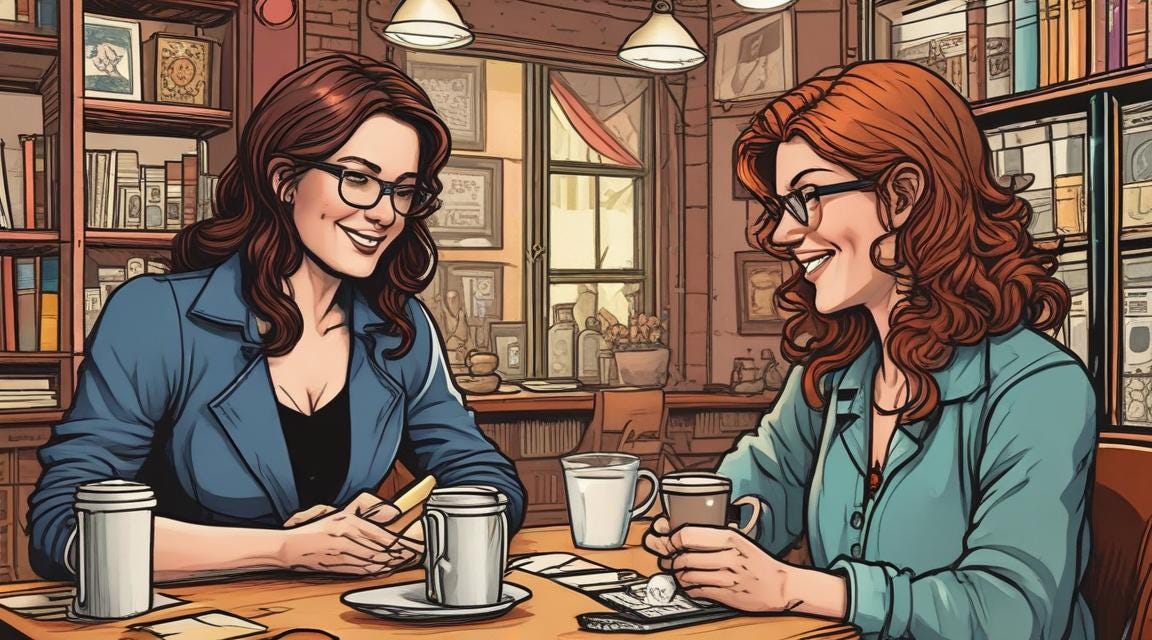Working with Editors Part II: Creating a Collaborative and Trusting Relationship
Building a solid relationship with your editor isn’t just about meeting deadlines—it’s about clear communication, professionalism, and working together to make your writing the best it can be.
In Working with Editors: Part I, we talked about how nailing your pitch is the first step in building a strong relationship with your editor. A good pitch doesn’t just sell your idea—it shows you’re serious, professional, and ready to collaborate.
But landing the pitch is just the beginning. The real work starts once you’re in the trenches, shaping that first draft into something stronger. And to get there, you need more than a great idea—you need a solid working relationship.
Having a great relationship with your editor isn’t some lucky situation you fall into. It’s about how you communicate, how you handle feedback, and how you show up, day in and day out.
Editors aren’t just there to approve or reject—they’re there to help make your work the best it can be. The more you treat the process as a partnership, the better off your project (and your career) will be.
In this article, we’ll explore how to create a collaborative, trusting relationship with your editor from the first email to the final draft. Think communication, professionalism, and a whole lot of flexibility. Let's get into it.
Writers’ Den full members – you’ll find sample emails at the very end to help you handle tough criticism, revision requests from your editor, missed deadlines, and more.
1. Set Clear Expectations Early
Before diving in, understand what kind of editing you’re dealing with. Is this a developmental edit, where the editor will help shape the structure and content of your piece?
Or is it more about line editing or copy editing, focusing on language, clarity, and grammar?
Knowing how hands-on your editor will be—and what they’re expecting of you—can save you from a lot of confusion or frustration.
Once that’s clear, define the scope of the project. What are the deadlines? How long should the piece be? Is there a specific tone or style the editor wants?
Recommended reading:
Nailing down these details upfront and in writing keeps the project on track and ensures everyone is working toward the same vision.
Finally, agree on how feedback will be handled. Will it come in stages or all at once? How many rounds of revisions are expected? What format should you expect for feedback; for example, are they marking up the draft in Word? Using Suggested or Tracked Edits? Comments? Paper and pen? You never know, so ask.
Establish a clear feedback process so you’re prepared for what’s ahead and can avoid any last-minute surprises. Clear communication from the start sets the tone for a smooth, productive collaboration.
2. Be Responsive and Professional
If you’ve ever watched Sex and the City, you might remember Carrie trying to dodge her Vogue editor after missing a deadline. Spoiler alert: it didn’t work out, and it won’t work out for you either.
Hiding from your editor when things get tough will only make you look unprofessional. The key to a strong editor-writer relationship is communication—and that means responding to emails and messages in a timely manner.
Whether you're on track or running into an issue, keeping your editor in the loop is crucial. If you know you might miss a deadline, communicate that before it happens.
Editors appreciate honesty and a heads-up far more than radio silence or last-minute panic. Proactively ask for an extension if needed, but make sure you have a good reason, and don’t make a habit of it.
Organization goes a long way. Keep your files clean and easily accessible—use clear naming conventions, save different versions, and provide updates professionally. An editor loves a writer who’s not only talented but easy to work with. Being organized and responsive shows you’re serious about your work and committed to the project.
3. Embrace Feedback with Openness
When you receive feedback from your editor—especially detailed, specific notes—remember that the time they’ve spent critiquing your work shows their investment in you.
It might feel harsh, but they’re pushing you to be the best writer you can be. They believe in your potential, so they’re digging into the details.
Instead of firing back or reacting defensively, take some time to digest the feedback. It’s okay to step away for a bit. In fact, it’s advised that you give yourself space to process the edits, which will help you see them more clearly and avoid reacting emotionally. You should have time for revisions built into your workflow and agreement with them.
Recommended reading:
If your editor has given feedback you don’t fully understand, sleep on it. Then, make a list of any points you need to address or clarify, and handle it all in one clear, respectful communication to your editor. This shows you’re engaged and serious about the process.
Remember, your editor’s job is to elevate your work, not to criticize you personally. Approaching edits with a learning mindset, rather than defensiveness, is key to growing as a writer. The more open you are to feedback, the more you’ll improve—and the better your writing will become.
4. Know When to Push Back (Respectfully)
While being open to feedback is crucial, there may be times when you feel strongly about keeping a particular element of your work intact. That’s okay—your voice and vision matter.
But when you do push back, make sure it’s done thoughtfully and respectfully. Instead of just saying, “I disagree,” explain why you feel a certain part of your work should remain as is. Whether it’s a key character trait or a specific tone, offering a clear rationale shows that you’ve thought it through.
That said, be prepared for compromise. Editors simply want what’s best for the project, and they may be considering factors you aren’t such as market fit or deeper knowledge of the audience.
What feels non-negotiable to you may need a slight adjustment to fit the bigger picture. Striking a balance between being flexible and firm shows that you’re not only passionate about the quality of your work but also that you’re willing to collaborate for the good of the final product.
Pushing back can be part of the creative process when done professionally and with reason. It strengthens the dialogue between you and your editor and, ultimately, results in a piece of work that feels true to both your vision and their expertise.
Being unwilling to compromise at all, so married to your own ideas and vision that you cannot flex, may put your project and your entire working relationship at risk.
5. Follow Through with Revisions
When it’s time to tackle revisions, be thorough. Don’t just skim through the feedback—go point by point, making sure you address each note your editor has given.
If there’s something you can’t resolve or don’t fully understand, communicate that clearly instead of glossing over it. Editors can tell when changes haven’t been fully addressed, and leaving things unhandled can lead to unnecessary back-and-forth.
One important note: never involve outside opinions at this stage.
Telling your editor that your significant other, friend, or anyone else "disagrees with their feedback" is unprofessional and undermines the editor’s expertise. It will damage the trust and collaborative dynamic you’ve worked hard to build. I’ve seen this happen, and it does nothing but damage the writer’s credibility.
As you work through revisions, save different versions of your draft. Keep backups of everything—track changes, highlight sections, and organize your files. I keep all drafts in a single Drive folder, for example, and create a copy for each new revision. They’re numbered v1, v2, v3, etc.
This makes it easier to review what’s been done and provides a clear record if your editor wants to revisit earlier drafts or compare versions (even easier than reverting to previous versions of the document).
Once the revisions are done, always take a moment to thank your editor for their input. Acknowledging their effort helps reinforce the positive, collaborative dynamic you’ve built together.
6. Maintain Professionalism After the Project
When the project wraps up, don’t just disappear—always take the time to thank your editor for their hard work and expertise. A quick, genuine message of appreciation goes a long way in maintaining a positive relationship.
Editors put in serious effort to make your work shine, so acknowledging that shows you respect the process and their contribution.
If things went well, let them know you’d love to collaborate again in the future. Editors are always looking for reliable writers who can deliver, so if you’ve built a good rapport, keep that door open.
Also, make sure to follow up after the piece is published. Share the link, let them know how it’s being received, or even just send along any positive feedback you’ve gotten. It shows you’re invested in the final product and that you see your editor as a long-term partner, not just a one-off collaborator.
It’s these little touches that keep you top-of-mind for the next project.
Final Thoughts
Building trust with your editor is about more than just meeting deadlines and getting the work done—it’s about strong communication, professionalism, and a willingness to collaborate. It’s about knowing when you need to bend, and how far.
Establishing clear expectations, responding promptly, and embracing feedback with an open mind sets the foundation for a productive and lasting working relationship. The more invested you are in the process, the smoother the entire project will be—and the better your writing will become.
In the next article, we’ll dive into one of the trickiest parts of the writer-editor dynamic: working through tough revisions and managing disagreements constructively. Stay tuned!
P.S. Full members, here are your email templates! Use these for inspiration to handle situations like unclear revision requests, disagreements with your editor, missed deadlines, and more.






